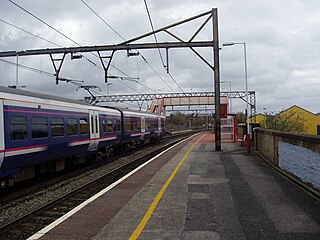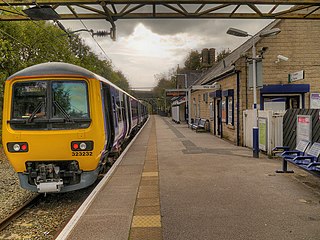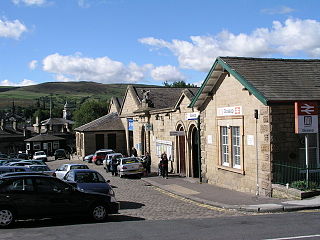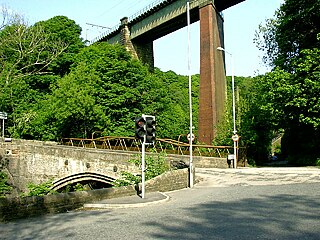
Broadbottom is a village in Tameside, Greater Manchester, England. Historically in Cheshire, it stands on the River Etherow which forms the border with Derbyshire.

Manchester Piccadilly is the main railway station of the city of Manchester, in the metropolitan county of Greater Manchester, England. Opened originally as Store Street in 1842, it was renamed Manchester London Road in 1847 and became Manchester Piccadilly in 1960. Located to the south-east of the city centre, it hosts long-distance intercity and cross-country services to national destinations including London, Birmingham, Nottingham, Glasgow, Edinburgh, Cardiff, Bristol, Exeter, Plymouth, Reading, Southampton and Bournemouth; regional services to destinations in Northern England including Liverpool, Leeds, Sheffield, Newcastle and York; and local commuter services around Greater Manchester. It is one of 19 major stations managed by Network Rail. The station has 14 platforms: 12 terminal and two through platforms. Piccadilly is also a major interchange with the Metrolink light rail system with two tram platforms in its undercroft.

Penistone railway station serves the town of Penistone, in the Metropolitan Borough of Barnsley, South Yorkshire, England. The current station, at the junction of the Woodhead Line and Penistone Line, opened in 1874; it replaced a station solely on the Woodhead Line, dating from the line's opening by the Sheffield, Ashton-Under-Lyne and Manchester Railway in 1845.

Stalybridge railway station serves Stalybridge, Greater Manchester, England. It lies on the Huddersfield Line, 7+1⁄2 miles (12.1 km) east of Manchester Piccadilly and 8+1⁄4 miles (13.3 km) east of Manchester Victoria. The station is managed by TransPennine Express.

Ashburys railway station serves the area of Openshaw, in Greater Manchester, England. It is a stop on a junction of the Glossop Line, the Hope Valley line and the freight line to Phillips Park Junction. It has been open since 1855 and is the nearest station to the City of Manchester Stadium.

Ardwick railway station serves the industrial area of Ardwick, in east Manchester, England; it is located about one mile (1.5 km) south-east of Manchester Piccadilly, on both the Glossop line and Hope Valley line. Plans to close the station permanently were shelved in 2006, due to increasing activity in the area. From the Summer 2024 timetable, the station has just two trains calling per day on Mondays–Fridays and one train per day on Saturdays.

Guide Bridge railway station serves Guide Bridge in Audenshaw, Greater Manchester, England, and is operated by Northern Trains. The station is 4+3⁄4 miles (7.6 km) east of Manchester Piccadilly on both the Rose Hill Marple and Glossop Lines.

The Stockport–Stalybridge line is a railway line in Greater Manchester, England, running north-east from Stockport to Stalybridge, via Guide Bridge. The line is used mainly by freight and empty stock workings, although it once had a frequent passenger service. In 1992, the service pattern reduced to a single weekly passenger train but, in 2018, this was increased to twice a week: one service in each direction on Saturday mornings. Services are operated by Northern, usually with a Class 150 diesel multiple unit. The line is intended to be electrified as part of the Transpennine Route Upgrade.

Gorton railway station serves the Gorton district of the city of Manchester, England. It is sited 2+1⁄2 miles (4.0 km) east of Manchester Piccadilly. The station is a stop on the Glossop and Hope Valley lines; Northern Trains operate all services that stop here and also manage the station.

The Glossop line is a railway line connecting the city of Manchester with the towns of Hadfield and Glossop in Derbyshire, England. It formed part of the historic Great Central Main Line between Manchester Piccadilly and Sheffield Victoria. Passenger services on the line are operated by Northern Trains.
The Sheffield, Ashton-under-Lyne and Manchester Railway was an early British railway company which opened in stages between 1841 and 1845 between Sheffield and Manchester via Ashton-under-Lyne. The Peak District formed a formidable barrier, and the line's engineer constructed Woodhead Tunnel, over three miles (4.8 km) long. The company amalgamated with the Sheffield and Lincolnshire Junction Railway and Great Grimsby and Sheffield Junction Railway companies, together forming the Manchester, Sheffield and Lincolnshire Railway in 1847.

Godley railway station serves the Godley area of Hyde, Tameside, Greater Manchester, England. It is 8+1⁄2 miles (13.7 km) east of Manchester Piccadilly on the Manchester-Glossop Line.

Newton for Hyde railway station, serves the Newton area of Hyde in Greater Manchester, England. Newton for Hyde is 7+1⁄2 miles (12.1 km) east of Manchester Piccadilly station and managed by Northern Trains. The station unusually features both a covered subway underneath the platforms and a larger viaduct tunnel accessible from both sides, meaning there are 2 ways to cross platforms underground. The eastern side of the station containing these passageways is raised on the viaduct.

Dinting railway station serves the village of Dinting in Derbyshire, England. It is a stop on the Glossop line and, prior to the Woodhead Line's closure in 1981, Dinting was a station on the Great Central Main Line between Manchester Piccadilly and Sheffield Victoria.

Hadfield railway station serves the Peak District town of Hadfield in Derbyshire, England. The station is one of the twin termini at the Derbyshire end of the Manchester-Glossop Line, the other being Glossop. It was opened by the Sheffield, Ashton-under-Lyne and Manchester Railway in 1844.

Glossop railway station serves the Peak District town of Glossop in Derbyshire, England. Glossop is the third busiest railway station in the county of Derbyshire after Derby and Chesterfield. It is located just north of Norfolk Square in the centre of Glossop.

The Manchester South Junction and Altrincham Railway (MSJ&AR) was a suburban railway which operated an 8+1⁄2-mile (14 km) route between Altrincham in Cheshire and Manchester London Road railway station in Manchester.

Godley East was a railway station on the Woodhead Line; it served the Godley area of Hyde, in Tameside, Greater Manchester, England.

Dinting Viaduct is a 19th-century railway viaduct in Glossopdale in Derbyshire, England, that carries the Glossop Line over a valley at the village of Dinting. It crosses the Glossop Brook and the A57 road between Manchester and Sheffield.

Broadbottom Viaduct is a railway viaduct that spans the River Etherow between Derbyshire and Greater Manchester in England. Originally of wooden construction supported by stone piers, the timber was replaced first with wrought iron box girders, less than 20 years after the viaduct's opening, later followed by steel trusses and more supporting piers.





















